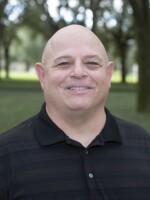Florida continues to struggle in its efforts to detect and treat lung cancer early, ranking low in several key measures, according to a new report from the American Lung Association.
Nearly 27% of Floridians diagnosed with lung cancer do not receive any treatment — one of the worst rates in the nation. The state ranks 45th out of 49 states with available data.
The findings are especially worrisome for a disease that remains the deadliest form of cancer in the nation.
For Brenda Connolly, chair of the association’s Gulf Coast Florida Board and administrator of the thoracic and sarcoma program at Moffitt Cancer Center, the numbers are deeply troubling.
The disease is among the deadliest cancers in the nation.
“It’s alarming that, just in general, lung cancer is a devastating disease. But then even in Florida, the lack of treatment, it’s dismal,” Connolly told “Florida Matters Live and Local” earlier this month.
Late diagnoses are holding back state
Florida ranks 42nd in the country for early detection. Just 26% of lung cancer cases in the state are caught at an early stage, compared with 28.1% nationally, according to the study.
“We're definitely higher than average, and the majority of those (cases) are late stage. They're being diagnosed later,” Connolly noted.
The consequences are stark. Connolly said the survival rate after a late-stage diagnosis is 10%. If caught early, the five-year survival rate jumps dramatically to about 65%.
“And we do have amazing stories out there because there are clinical trials that have people being diagnosed at late stage … and they do survive because we've made lots of progress,” she said.
Part of the challenge, Connolly said, is that few eligible Floridians are getting screened. Only 18% of high-risk patients undergo lung cancer screening — lower than the national average, though not significantly.
ALSO READ: Florida gets an 'F' in protecting residents from tobacco dangers
She pointed to several barriers: lack of access, underinsurance, limited awareness among patients and providers, and stigma.
“There's terrible stigma around lung cancer because people think it's a smoking disease, which it is. Eighty percent of lung cancers can be attributed to smoking. But there are other factors, and we're seeing more and more women, more and more nonsmokers being diagnosed,” she said. “I really want to encourage them not to succumb to that stigma.”
After smokers, some of the higher risks are experienced by people exposed to secondhand smoke and those in lower-income communities, Connolly said.
The study confirmed the stigma and fear can “prevent eligible patients from accessing treatment that may save or extend their lives,” Connolly said.
Florida’s smoking rate, at 10.5%, is roughly average compared to the nation.

Reaching patients where they live
To combat these diagnosis gaps, Moffitt launched a mobile lung screening unit a year ago — the first of its kind in Florida. The goal is to bring screening directly to underserved communities with limited health care access, Connolly said.
She said the unit is already finding more serious cases in the areas the mobile unit serves than at traditional hospital sites.
“What we have found is that when we are going out to these hard-to-reach areas … the significant finding is much higher than if it was at a brick or mortar. We're targeting these high-risk areas that may not have access,” she said.
And screening isn’t where the effort ends.
ALSO READ: Moffitt Cancer Center plans to build 200-room hotel on North Tampa campus
“Part of it is we want to make sure that those folks, we're not going to just say, ‘Oh, you have lung cancer.’ How do we help them navigate to get into a facility to get the treatment they need?”
Changing minds requires building trust patient by patient.
“What we have determined is that we are going out into the community … and educating folks and just letting them know it's OK. Letting them know that they're not alone. Letting them know that this is going to save their life,” Connolly said.
Insurance and policy changes
Although Florida has begun requiring some insurance plans to cover comprehensive testing for biomarkers — measurable indicators that can guide personalized treatment — coverage remains inconsistent across the country.
Connolly said criteria for insurance-paid screening remain strict.
“Vaping is not included in that. It has to be tobacco, over (age) 50, and a 20-pack-a-year smoker,” she said.
ALSO READ: Racial disparities in lung cancer start with research
Researchers, advocates and policymakers are pushing for expanded eligibility — including groups such as firefighters and others exposed to environmental risks outside the standard categories.
“Lung cancer is not a death sentence, especially if it's caught early,” Connolly said. “If you're a smoker, don't hesitate to get screened. You could save your life.”
This article was compiled from an interview conducted by Matthew Peddie for WUSF's "Florida Matters Live and Local."




